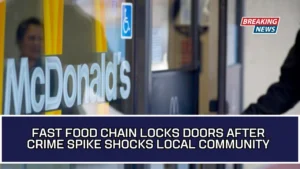A long and devoted 28-year federal career has come to an abrupt end in Kansas City as part of widespread government budget reductions in 2025.
The news has not only impacted one worker’s life but also sent shockwaves through the local federal workforce and the greater Kansas City community.
These budget-driven layoffs highlight a growing concern about the future of federal employment and essential services in regional hubs across the U.S.
A Career Ends Unexpectedly
One federal employee, who dedicated nearly three decades of public service, was recently informed that their position had been eliminated. The employee worked across multiple states and agencies, eventually settling in Kansas City with a role that provided critical services to underserved populations.
The layoff notice came without warning—access badges disabled, emails stopped, and offices shut down. The worker, like many others, faced the emotional and financial toll of an unexpected job loss.
With years of expertise and no prior incidents, the abrupt end underscores how even the most seasoned professionals are not immune to broader federal cutbacks.
Widespread Layoffs in Kansas City
Kansas City has long been home to a large and diverse federal workforce, with tens of thousands employed across various agencies. In 2025, a new wave of budget reductions has led to job losses in key departments such as:
- Department of Health and Human Services (HHS)
- Internal Revenue Service (IRS)
- U.S. Department of Agriculture (USDA)
- Social Services and Community Outreach Programs
The layoffs are part of a federal push to consolidate operations, cut spending, and reduce the physical footprint of government buildings in regional areas.
Community and Economic Impact
These layoffs have a ripple effect far beyond the individual employees. When experienced professionals lose their jobs, communities lose their services. Kansas City has already seen:
- Reduced funding for public health programs
- Suspension of food assistance grants for low-income neighborhoods
- Delays in child welfare outreach
- Increased pressure on local employment support systems
In addition to service disruptions, the local economy is expected to suffer. Economists estimate that for every federal job lost, an additional 1 to 2 private-sector jobs may be indirectly affected due to reduced consumer spending and business closures.
Real Estate and Housing Challenges
One overlooked consequence of these federal layoffs is the strain on housing. With leases canceled and government tenants departing, Kansas City’s commercial and residential markets are experiencing unexpected turbulence:
- Office space vacancy rates are rising
- Renters are terminating leases early
- Property owners are left with large, unoccupied units
This change has disrupted long-term investments and plans made by landlords and developers who relied on federal occupancy as a financial anchor.
Federal Layoff Impact in Kansas City
| Area Affected | Details |
|---|---|
| Individual Employees | 28+ year careers abruptly ended without notice |
| Agencies Impacted | HHS, IRS, USDA, Social Services |
| Community Services Lost | Public health, food access, child/family support |
| Economic Effects | Private job losses, reduced spending, slower economic growth |
| Real Estate Consequences | Increased vacancies, financial strain on landlords |
The sudden termination of a 28-year federal career in Kansas City is a sobering reminder of how government policies and budget decisions can profoundly affect real people and communities. As more workers face similar fates, questions arise about how essential services will be maintained and how local economies will adapt.
It is crucial for displaced workers to have access to support systems, retraining programs, and transparent communication moving forward.
As the Kansas City region adjusts, the resilience of its workforce and the strength of its community will play vital roles in shaping what comes next.




